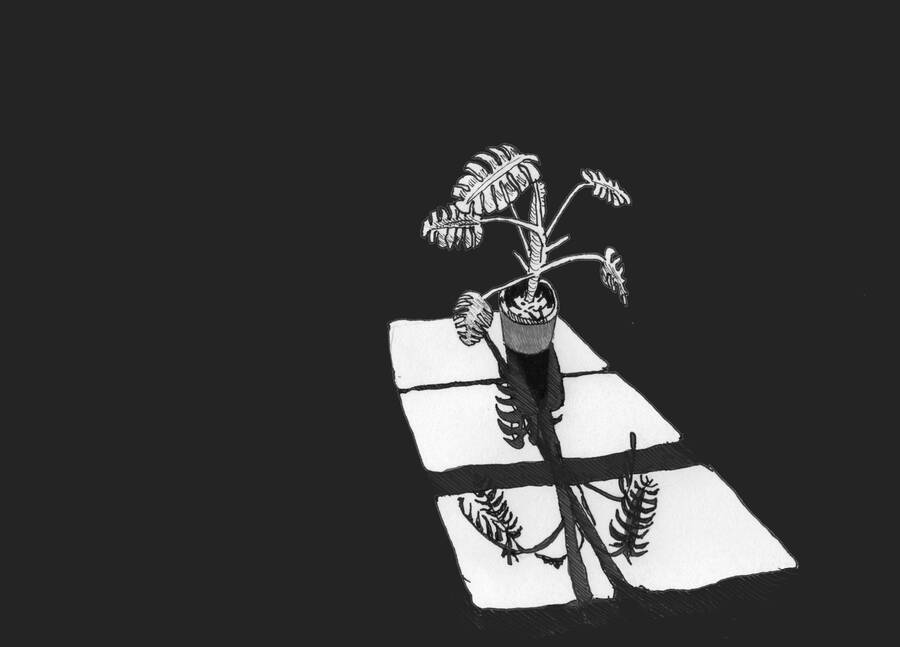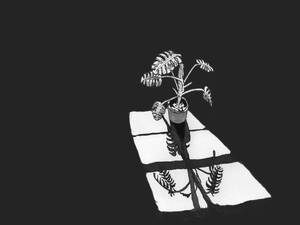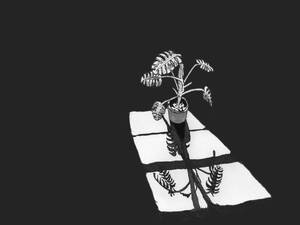Provisions #3: “Pain was everywhere. Sprang out of everything”
Meditations in a crisis on poems by Else Lasker-Schüler, beyza ozer, and Gregg Bordowitz.

In “Provisions,” three poetry readers reflect on a poem they’ve been holding close during this difficult time.
THE POET ELSE LASKER-SCHÜLER (1869–1945) felt the urge to sing, and she didn’t know why. So she wrote a poem, “Abends.” The poem replaces the song that maybe never materialized. (These spring days of 2020, when concentration eludes me, I use brief lyrics by vanished poets as attention-anchors.)
The song-wish hit her in the evening, at the borderline hour that Robert Schumann and hundreds of other Romantic and Expressionist artists knew marked mood’s return. A baleful moment for everyone, when evening arrives, with its retinue of effacements—its chromaticism. Is evening, after 1913, always atonal?
“Pain was everywhere. Sprang out of everything . . . ” All the objects around her—trees, drapery, concepts—sent forth a command: to suffer, to be hyper-conscious, to experience acuteness itself, as if acuity could arrive separately from the affects it enrobed. The things may not have intended to emit agony. To give things their awful dignity I should capitalize Things; we should honor those obstacles—boats and boulevards and dictionaries—encumbering us. Things don’t have empathy. Coarsely they remain fastened to their identities, and refuse our come-hither.
Finally the dolor lay on top of Else Lasker-Schüler; she was truculence’s last stop on its route. I enjoy when a lover puts his weight on me. Like damp sand, I need to be pressed by beach-wandering feet. But when pain levels me into the dirt, am I delighted by the inanimate’s adamancy?
This ostensibly simple poem resists fathoming. Does song intensify her bitterness? Does she feel guilty for exhalation? Was singing an impulse that she should have squelched? Does poetry extirpate misery? Can we give names to these things—“Dingen”—encircling us, or must they remain unspecified eminences?
“Dingen” rhymes with “singen.” We sing and we thing. This terse poem, virtuously reticent in the midst of its outgoingness, mentions neither the source of the poet’s sadness nor the nature of her song. We know merely that she felt a sudden (and perhaps unrealized) expressive liberation, and that a desolate aftermath followed her quick spontaneous release.
I keep circling this poem as if it holds the answer to a riddle, but the poem is, in fact, the riddle itself. The puzzle it proposes returns every time I read these lines, their transparency a lure, a screen growing opaque when I disturb its resistant surface with my inquiry. The poem pretends to solve the enigma, but her mood’s unspeakability lays its rhythmic weight on our will to draw conclusions.
For years I’ve carried near me this little book, Lasker-Schüler’s Selected Poems, translated from the German by Audri Durchslag-Litt and Jeanette Litman-Demeestère, and published by Green Integer in 2002. Here’s a brutal biographical fact cited on the pocket-sized volume’s back cover: “When the Nazi government took power, Lasker-Schüler, after being accosted by a group of Nazis and beaten with an iron rod, immediately boarded a train to leave Germany.” It may be preposterously maudlin and ahistorical for me to imagine that the evening weight descending upon her in this poem prefigures the iron rod. A fit of melancholy isn’t the same as state-sanctioned violence. But let me suggest that a person is an impressionable surface, and that poems can train our capacity for noticing how impressions get made—almost invisibly—through words, and through the monstrosities and transports that words, when they are direct and when they are covert, can evoke.
The previous sentence—or a more complicated version of it, including the phrase “the weight of articulation,” an attempt to explain why writing and reading are, at this moment, so difficult for me—was going to be my conclusion. But before I said goodbye to this little essay, I needed to find an online translation of “Abends,” to offer as a link for you, reader. The translation I found was by the great Irish poet Eavan Boland. By sad synchronicity, the day after I discovered her translation, a gracefully demotic and impetuous rendering, she passed away. I’d like to imagine that Lasker-Schüler would have understood, and admired, this line from Boland’s poem “The Pomegranate”: “Will we ever live so intensely again”?
—Wayne Koestenbaum
IT WOULD COME AS NO SURPRISE to anyone who knows me—least of all myself—to hear that I am spending my days thinking about love again. And, as always, I am thinking about how to detangle real love from the overarching, sanitized and generalized idea of love that seems to float down from above and blanket anxious or painful moments like our current one. The new Fiona Apple album begins with the song “I Want You To Love Me,” and I have been so wonderfully haunted by that tune during this time of reconsidering love and all of its movements. I don’t believe the song to be an arms-open plea to some vast and unknowable “you,” as the title might suggest. It feels, instead, like a person who had loved someone else for ages, pleading for their love to return to a happier era. Perhaps I’m projecting my own interests in love onto the song, but I feel like the urgency in the lyrics brings me closer to something familiar that has grown distant.
In the spirit of naming loves, I do love beyza ozer’s work. They write whimsically and delicately, stretching out a moment until it feels like a universe, eager to cradle a reader. I thought of “I Think This Is The Last Love Poem” while weighing my many excitements about the Fiona Apple song. This poem feels to me to be—among other things—an ode to the way we can reinvent seeing the familiar people in our lives. The way they can take new forms within our larger affections. I appreciate how love appears in this work, as well. As uncertain, delightfully exhausting, and earnest as it is in the Apple song. But also worthy of celebration—especially in the opening: “When Arabella laughs it feels like / allah’s prayer in my heart.”
I am confident that a part of me is drawn to those lines, specifically, because I have heard a call to prayer and been moved by it, or because I have had my life illuminated in the pursuit of belief in that which I could not see. My days interrupted by prayer, five times, even though I wasn’t certain whom or what I believed in.
But, even beyond all of this, I return to “I Think This Is The Last Love Poem” because of its final ask: the poem doesn’t overly romanticize the emotion of love itself, but instead proposes a companionship that might aid in making the world less miserable. Even briefly. I love how eagerly the poem challenges those sanitized conventions of unblemished love that I hold at a distance. I keep knocking at the door of this poem because of the way it puts to language what it is to want someone—not to distract you from the burning world, but to make enduring it a little bit easier.
—Hanif Abdurraqib
“HALOGEN LONELINESS DISAVOWAL.” I love this line by Gregg Bordowitz, from “April 23, 2018, Wednesday, 7:15–7:48 a.m”—part of “Wake to Dread,” a series of poems and letters documenting the debris field of headlines and preoccupations that make up everyday life. Halogen loneliness disavowal speaks to my general mood, a pattern of moods, what Gregg describes in the letters as “morbid realism.” It’s the kind of feeling I get when I shake the Magic 8-Ball, and the floating 20-sided die replies, “Outlook not so good.” Gregg’s line resonates with an ongoing and uncanny experience of prolonged fatigue—dread, yes, but also alienation. The energy of the halogen light bulb is finite; it burns out too fast. Still, its glow makes me want to turn toward the past (a disavowal of the present) and listen to Joy Division’s “Isolation”—not because I want to dance, but because I am pissed off. I want to rally, I want to regress. At some point I decide to shave my head.
The ambient dread endemic to late-stage capitalism infuses the poem with a world-weary energy. The drive for maximum profit at the expense of human life infects everything, like “the virus.” It permeates our social relations and structures our silences: This is how long your lunch break is. This is how many vacation hours you have accumulated. This is how much sick leave you’re allowed despite (or, rather, because of) the fact that you are now considered an “essential worker.” And forget about sleep. What you can expect in its place is the siren sounded by the poem’s opening line: “awake alive nightmare slumber exhaust.”
As each of the poem’s ten-syllable lines oscillates between inventory and experience, inventory as experience—“Wake mister alarm phone set disgrace defeat”—I hear echoes of my own restlessness. I’m lonely, and I’m burnt out. These fragments are what’s left, the speaker seems to suggest. I, too, have forsaken verbs and forgotten how to speak in complete sentences. Since the shutdown 37 days ago, I feel so bombarded by experiences of language that I am having trouble processing and prioritizing information. ATM withdrawal receipts take on the same urgency as late-night text messages from friends in New York. What does it mean to prioritize my understanding of information over my understanding of my own feelings, when the truth is my feelings are information? (I’m reminded of Yvonne Rainer’s memoir Feelings are Facts . . . ) I use the poem to help me tend to my inner coral reefs, and at daybreak, truth, desire.
In the wake of all that—and following a Zoom conversation with my therapist where I admit I am a demanding person who is both disinterested in and incapable of spelling out my actual desires—I’m returning to Gregg’s poem, attending to its time-stamped list of items. The specificity of some of its objects—“salt seed shavings,” “rain blossoms”—disarms me. Were I to begin every morning, as I imagine Gregg does, and create a poem fashioned of the arbitrary and indispensable artifacts that first come to mind, I might better recognize my desires, if not learn how to own them outright.
—Lara Mimosa Montes
Wayne Koestenbaum—poet, critic, artist, performer—has published 20 books, most recently Figure It Out (Soft Skull Press, 2020) and Camp Marmalade (Nightboat Books, 2018). He received an American Academy of Arts and Letters Award in Literature.
Hanif Abdurraqib is a writer from the east side of Columbus, Ohio.
Lara Mimosa Montes is the author of THRESHOLES, forthcoming from Coffee House Press. She was born in the Bronx.


